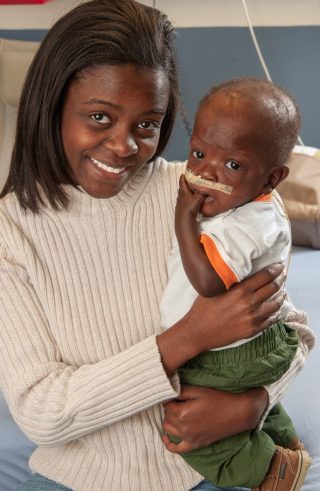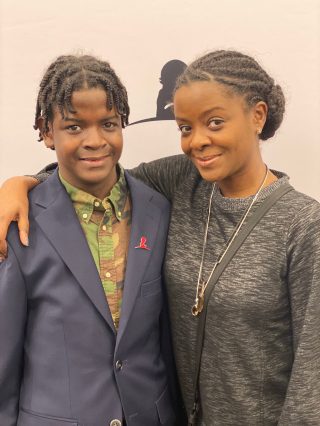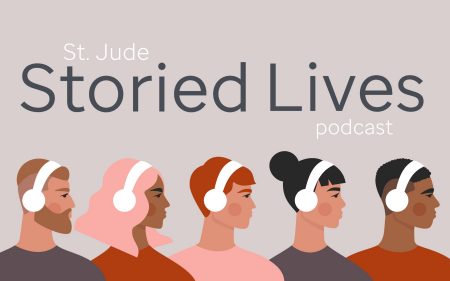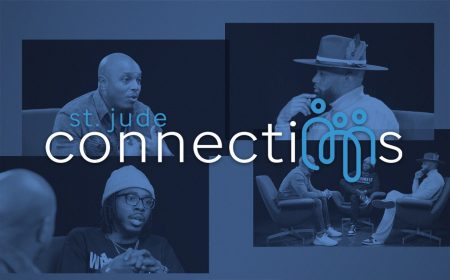
Fifteen years ago, D’Anna and her baby flew to St. Jude as Katrina evacuees
Mason was a preemie with liver cancer. D’Anna was a young mother at the beginning of college. She opens up about their life since, and the parallels she sees between the devastating hurricane and COVID-19 pandemic.
Mason was a preemie with liver cancer. D’Anna was a young mother at the beginning of college. She opens up about their life since, and the parallels she sees between the devastating hurricane and COVID-19 pandemic.

There is a moment I’ll never forget. My family and I were sitting there at a restaurant on St. Charles Avenue in New Orleans and noticed, “Where is everybody?” And one of the waiters said, “You guys gotta go. Hurricane Katrina is coming.”
Mason was still in the hospital, having just been diagnosed with liver cancer, and we sat there stunned. All of this had been going on around us and we hadn’t even realized it.
Within days we were in an ambulance to Baton Rouge, and then a plane to St. Jude Children’s Research Hospital in Memphis as medical evacuees. Hurricane Katrina bore down on the Gulf Coast and overwhelmed the levees, changing the direction of so many lives.
I frequently think about how kind and compassionate everyone was at St. Jude and all the little things done to show empathy and understanding.
While Mason was teetering and tottering around the St. Jude campus as he received treatment and learned to walk, the time was foundational for me as well, helping me know myself. My experiences with Mason at St. Jude framed my idea of what I could contribute and how I could impact families like mine. Today, I work in health care administration in the area of patient experience.
The experience changed both our lives.
The COVID-19 pandemic feels the same way as Hurricane Katrina in the sense that its danger dawned on me slowly. One day early in March a colleague mentioned the coronavirus offhandedly. But later in the week as the universities started to close, it hit me: “Oh my gosh, this could turn into a very serious situation, and it’s just me and my son Mason here in Illinois.”
I wondered what would happen to Mason if something happened to me. Certainly if he gets sick, I’m accustomed to being his advocate and the mom at the bedside. I’ve kind got that role down pat, but what if something happens to me and I get sick and there’s nobody here to help care for him?
Mason has ongoing health issues related to a trach tube he had for several years. Respiratory-wise, he has a condition called portal hypertension, which is related to the liver. He’s thrived despite living with some of the side effects of those two things, but the truth of the matter is that Mason still is immunocompromised.
I realized I needed backup from my family, but they were already on it.
I’m part of a huge, super close-knit family from South Louisiana, and we have an attitude of being hopeful, determined and resilient. That’s something you’re born and bred with in South Louisiana. You go through a lot of difficult times.
In the same way that my family rallied around Mason and me during Katrina, they rally around us now.
A lot of people in my family have careers in health care, and their approach echoed the sort of quick, organized response to disaster you see in that field.
Through phone calls and text messages, they did the following: identified the family members who might be vulnerable, decided where they would be safest, determined the method of transport and created a communication network so we could all stay in touch.
The decision was mine to make, but I never felt alone. Mason and I packed up the car and we drove from Illinois to Texas to socially distance with my aunt’s family. We are here for the time being.
We’ve had family members in Louisiana who’ve had COVID-19 and they’ve recovered, thankfully, but we’ve also had family friends who’ve passed away. We’re definitely being impacted. We answer every phone call from family members checking in or giving updates, and we do what we can to support each other.
When we were at St. Jude, it was Mason who gave me my hope. He gave me hope then and he still gives me so much hope and so much inspiration on a daily basis. He’s still a morning person just like when he was a baby. He still gets up at 5 o’clock in the morning and says, “Good morning!” He has such a positive attitude about everything. So you can’t help but have a positive attitude and be around Mason.
I’ll give you an example.
There was a situation going on with my house in Illinois and one of my neighbors called me. I started fretting, “I’ve got to figure this out. What am I going to do?”
Mason just looked at me calmly and said, “Mom, everything is going to be OK.”
He was right. It will be.
Having worked in health care for some time now, I have faith that as a health care community, we’re going to figure out what needs to be done, whether it’s a vaccine or some type of treatment for COVID-19.
Look at St. Jude advancements over the past 25 years alone. Diseases once thought to be incurable are curable now. There’s always hope on the other side of these stories and Mason himself is proof.

Mason is a teenager now, so despite all the challenges he faced as an infant, he’s made it so far, and is doing pretty great. He’s taking Honors English and he’s really into art, music and foreign language. He’s on the phone with girls all the time. He is a blessedly normal 15-year-old. There is so much hope in that fact alone.
We’ve got to honor the people we’ve lost by staying positive and working toward a brighter future. If we stay positive and take care of each other, we will get to the other side.





